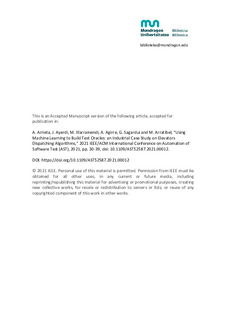
Izenburua
Using Machine Learning to Build Test Oracles: an Industrial Case Study on Elevators Dispatching AlgorithmsBeste instituzio
IkerlanOrona S.Coop.
Bertsioa
Postprinta
Eskubideak
© 2021 IEEESarbidea
Sarbide irekiaArgitaratzailearen bertsioa
https://doi.org/10.1109/AST52587.2021.00012Non argitaratua
IEEE/ACM International Conference on Automation of Software Test (AST) 2021, pp. 30-39Argitaratzailea
IEEEGako-hitzak
Machine learning algorithms
software algorithms
Legislation
Machine learning ... [+]
software algorithms
Legislation
Machine learning ... [+]
Machine learning algorithms
software algorithms
Legislation
Machine learning
Maintenance engineering
Prediction algorithms
Software [-]
software algorithms
Legislation
Machine learning
Maintenance engineering
Prediction algorithms
Software [-]
Laburpena
The software of elevators requires maintenance over several years to deal with new functionality, correction of bugs or legislation changes. To automatically validate this software, test oracles are n ... [+]
The software of elevators requires maintenance over several years to deal with new functionality, correction of bugs or legislation changes. To automatically validate this software, test oracles are necessary. A typical approach in industry is to use regression oracles. These oracles have to execute the test input both, in the software version under test and in a previous software version. This practice has several issues when using simulation to test elevators dispatching algorithms at system level. These issues include a long test execution time and the impossibility of re-using test oracles both at different test levels and in operation. To deal with these issues, we propose DARIO, a test oracle that relies on regression learning algorithms to predict the Qualify of Service of the system. The regression learning algorithms of this oracle are trained by using data from previously tested versions. An empirical evaluation with an industrial case study demonstrates the feasibility of using our approach in practice. A total of five regression learning algorithms were validated, showing that the regression tree algorithm performed best. For the regression tree algorithm, the accuracy when predicting verdicts by DARIO ranged between 79 to 87%. [-]





















